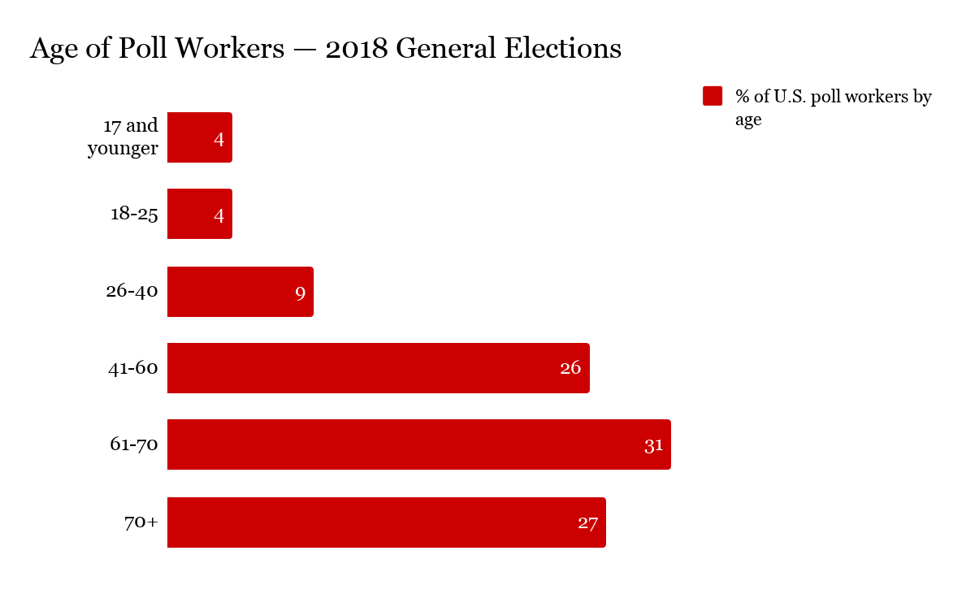One of the most urgent threats to a safe and secure election is the availability of poll workers to work leading up to and on election day. This was most recently evidenced by the chaotic primary elections in Georgia, Washington D.C., Pennsylvania, and South Carolina. In multiple counties across America, voters waited in line for up to seven hours, while attempting to maintain social distance. These arduous wait times were, in part, because of a shortage of polling staff, who are critical to ensuring a smooth voting process.
The older average age of poll workers is particularly problematic, given their higher risk for COVID-19.
In the 2018 general election, for example, six-in-ten poll workers were 60 or older, and a quarter were over 70 years old.
This is why—in addition to providing quality protective gear for poll workers of all ages—a grant program should be set up that incentivizes college-age individuals to participate in election administration—particularly, to work polls across America on election day.
Percent of U.S. Poll Workers by Age — 2018 General Elections

*Data provided from a chart published by Pew Center.
The concern about a second wave of the virus in the fall, coupled with the difficulty in finding poll workers, is of particular concern amidst the pandemic. This is why it makes sense to encourage lower-risk individuals to alleviate some of the burden from older polling workers.
College-age students are significantly less likely to experience severe complications from COVID-19. Currently, the relative risk of dying from COVID-19 for individuals ages 15-24 is 0.55 (deaths per 100,000 population), whereas the risk jumps to 2.24 for individuals 45-54; 2.09 for individuals ages 55-64; and 2.13 for individuals between the ages of 65-74. To minimize health risks associated with voting in person and working in election administration, it makes sense to utilize the populations that are least likely to develop severe complications: healthy, low-risk, college-age students. And for many in that age demographic, payment for the work is becoming increasingly necessary.
To ease the financial hardship many Americans are currently experiencing, the CARES Act provides economic impact payments to most individuals making less than $75,000 per year. Parents with children 16 and under are also eligible for an additional $500 per child, leaving “children” still claimed as dependents on their parents’ tax return (aged 17 to 24) ineligible for stimulus funds.
For the 16.9 million students enrolled in colleges and universities across America, COVID-19 presents an unprecedented challenge. Many students are in debt and rely on work programs on campus or temporary summer jobs to supplement the cost of classes, car payments, and interest on student loans. High unemployment, the loss of campus jobs due to school closures, and ineligibility for stimulus funds have put many college-age students in significant financial hardship.
Legislation that offers temporary grants to college-age individuals to play a more active role in upcoming elections will help Americans participate safely in in-person voting (if they choose). It would also provide financial assistance to struggling students, and encourage civic engagement across the spectrum. We strongly urge lawmakers to consider this proposition when debating the next COVID-19 response legislation this summer.
Photo credit: Public domain